Nvidia Geforce RTX 4060 Ti 8GB Founders Edition review
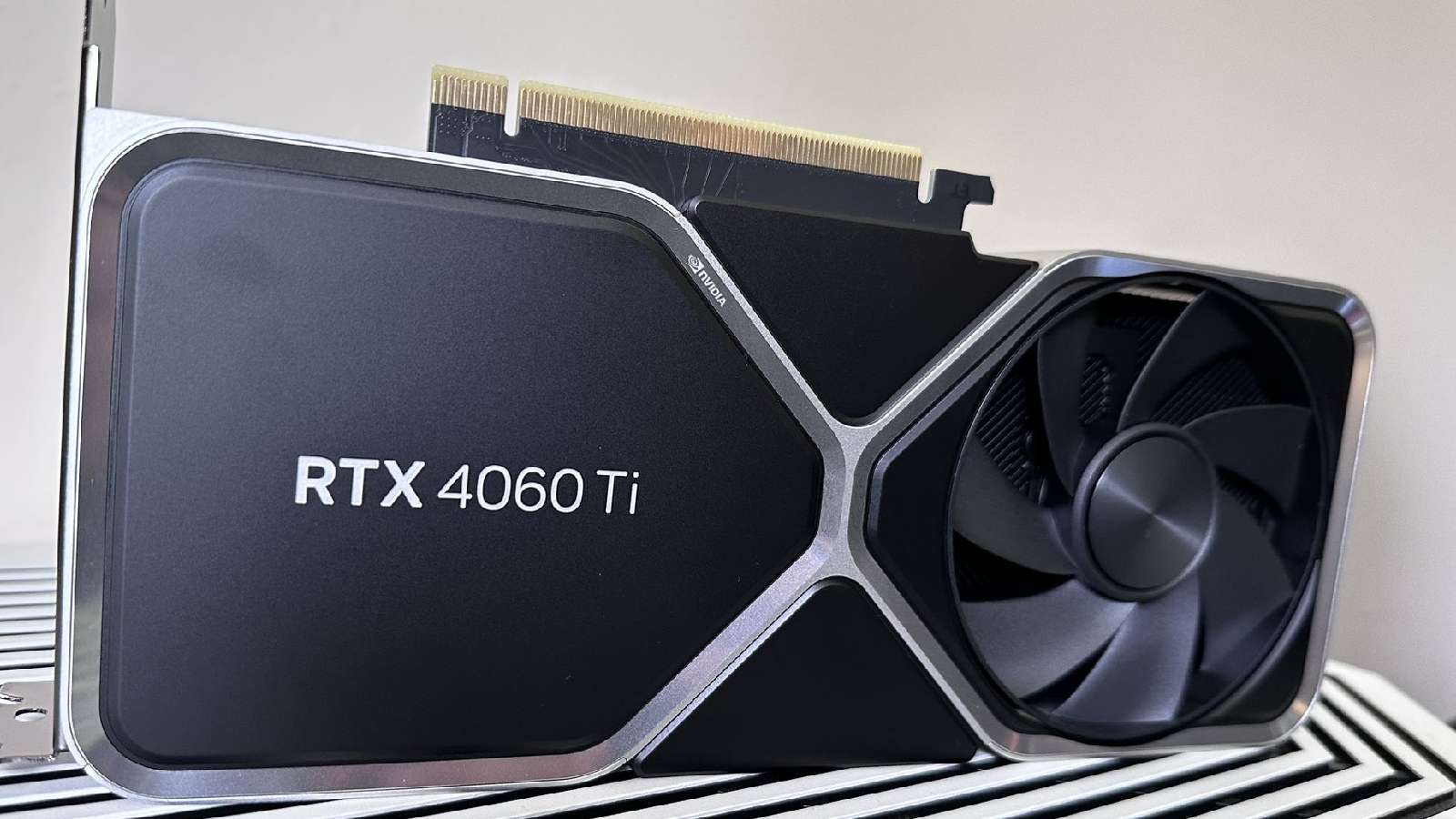 Dexerto
Dexerto Nvidia’s RTX 4060 Ti 8GB is the first 60-class GPU of the RTX 40-series. We dive deep to tell you if this new GPU is worth the $399 Nvidia is asking for this cut-down silicon.
Reviewing a graphics card can become pretty rote. You go through the motions of listing down all of the benchmarking data, and a lot of the story is told in raw numbers. But, for the RTX 40-series, Nvidia has priced its higher-end GPUs at significantly higher price points than previous generations.
But, one small bastion is that the “60” series graphics cards have all been relatively attainable. The RTX 3060 is the most popular GPU right now and it’s clear that Nvidia does not want to cede that ground with how competitive the pricing on the $399 RTX 4060 Ti is. But, the GPU is also not without its limitations.
Key specs
| GPU | Nvidia GeForce RTX 4060 Ti Founders Edition |
| CUDA cores | 4352 |
| Boost clock | 2535 MHz |
| Memory clock | 9000 MHz |
| Memory speed | 18 Gbps |
| Memory | 8GB GDDR6X |
| Memory bus width | 192-bit |
| TGP | 160W |
| Power input | 16-pin |
| Size | Dual-slot |
| Display outputs | 3x DisplayPort 1.4a, 1x HDMI 2.1 |
| Price | $599 |
Design
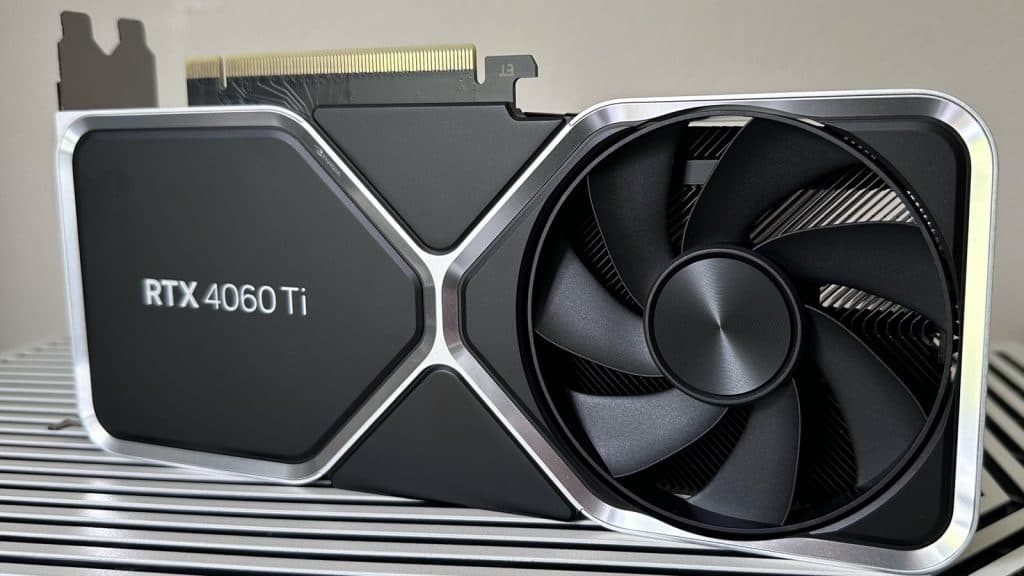 Dexerto
Dexerto The RTX 4060 Ti Founders Edition model has the exact same cooler seen on the more premium RTX 4070. That means an all-metal flow-through heat-spreader that comes with a stellar two-slot design. However, the metal finish of the GPU has been switched over to a lighter metallic sheen, becoming pure silver, compared to the darker shades found on the higher-end models. This is likely the last Founders Edition card in the RTX 40-series stack, as its 16GB variant and base 4060 model will not be getting Founders Edition models.
As with any other Founders Edition graphics cards, also present is the 12VHPWR port, which allows for a cleaner look if you have an ATX 3.0 PSU. For everyone else, you’ll have to use the 2x 8-pin to 16-pin converter included within the box.
What’s more interesting are the internal components of the GPU itself. The die being used here is a cut-down AD106 GPU, with 8 GB of VRAM housed within. Interestingly, the bus width of the RTX 4060 Ti is just 128 bits, giving you 288 GB/s of bandwidth.
However, the size of the RTX 4060 Ti’s L2 cache has also been increased substantially to 32MB, allowing the memory to communicate with your system much faster than the simple bandwidth number would imply. Nvidia claims that with the expanded cache, you attain an effective speed of 554 GB/s.
Is 8GB of VRAM really enough in 2023?
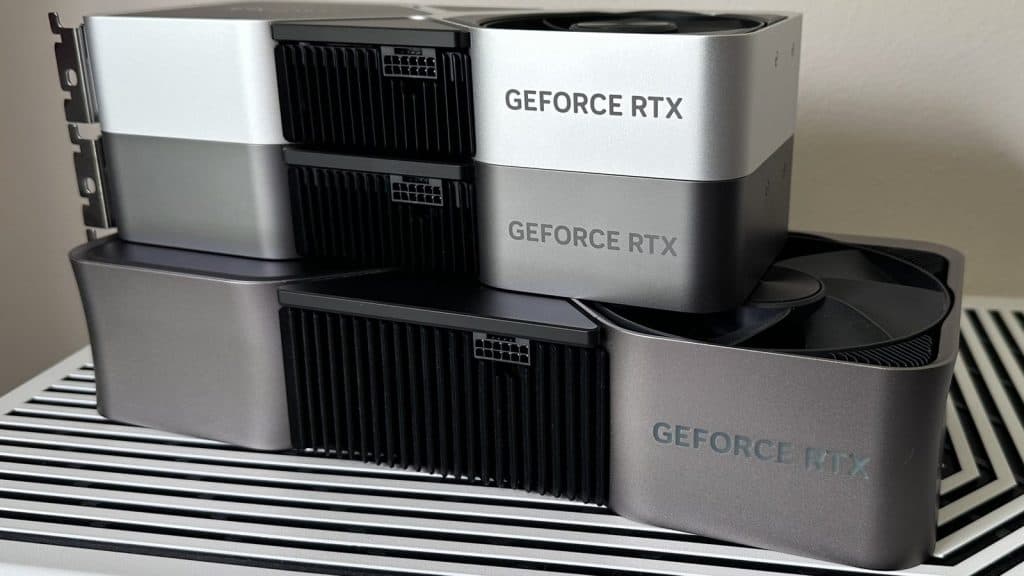 Dexerto
Dexerto One of the more pressing concerns about the GPU is the amount of VRAM it houses within it, with many claiming that 8GB just isn’t enough for modern gaming. Even AMD has hit out at Nvidia for its seemingly stingy memory options for its high-end graphics cards. Being equipped with only 8GB of VRAM could mean that games running on engines such as Unreal 4 might have to turn down their texture quality settings at higher resolutions.
But, the RTX 4060 Ti is not geared towards gaming at higher resolutions and instead flourishes at 1080p and 1440p. We have also benchmarked the GPU at 4K, but don’t look for the best performance there, as a higher-end GPU like the RTX 4070 and above are much more suited to handle higher resolutions.
To combat this, Nvidia will also be releasing the RTX 4060 Ti in a 16GB flavor later this year, but the pure specs of the card otherwise remain exactly the same. But, how does its performance check out when compared to the rest of Nvidia’s latest and greatest?
Performance
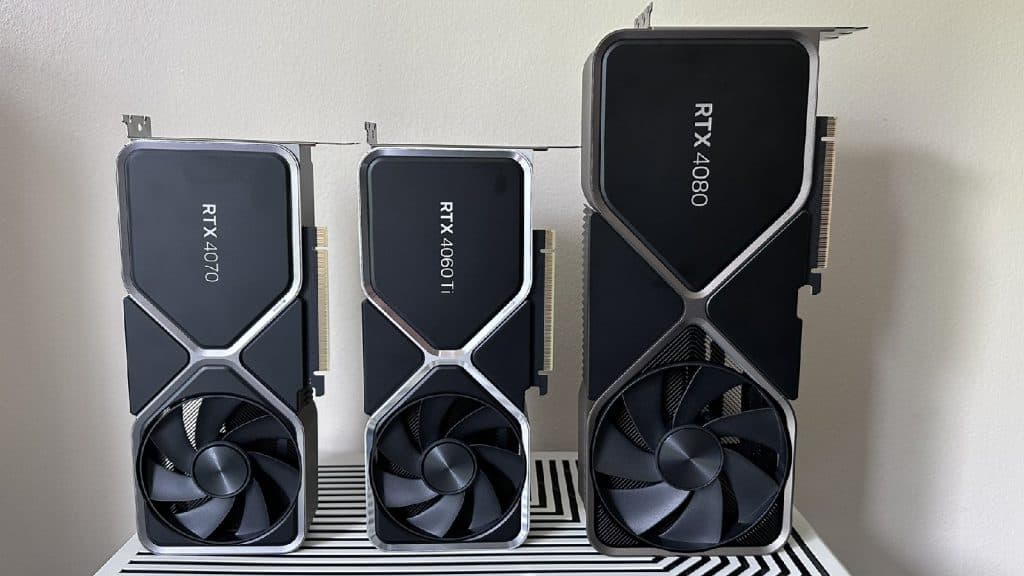 Dexerto
Dexerto The RTX 4060 Ti 8GB has been primarily positioned as a 1080p GPU. Though, we think that if you’re dropping $399 on a modern GPU, it should also have some chops at certain titles at a higher-resolution, too. That’s why we’ve benchmarked at all three resolutions, to give you the best idea of what performance looks like for this particular GPU. We’ve also added two AMD options, a RX 6700 XT and RX 6800 for 1080p and 1440p performance benchmarks, as these are similarly priced GPUs.
We do not have an RTX 3060 Ti or RTX 3070 to hand to test gen-on-gen performance. However, even in statistics supplied by Nvidia, the differences in pure rasterization workloads are small.
To do this, we’ve once again employed the work of our trusty testbench, which was used as our fastest esports gaming PC from last year.
Test System
- CPU: Intel Core i5-13600K
- CPU cooler: Cooler Master PL360 Flux
- Motherboard: ASUS ROG Z790 Maximus Extreme
- RAM: ADATA XPG Lancer RGB 32GB DDR5-6000
- Storage: Sabrent Rocket 4 Plus 4TB
- Case: Hyte Y60
- PSU: EVGA Supernova GT 1300
RTX 4060 Ti 8GB 1080p performance
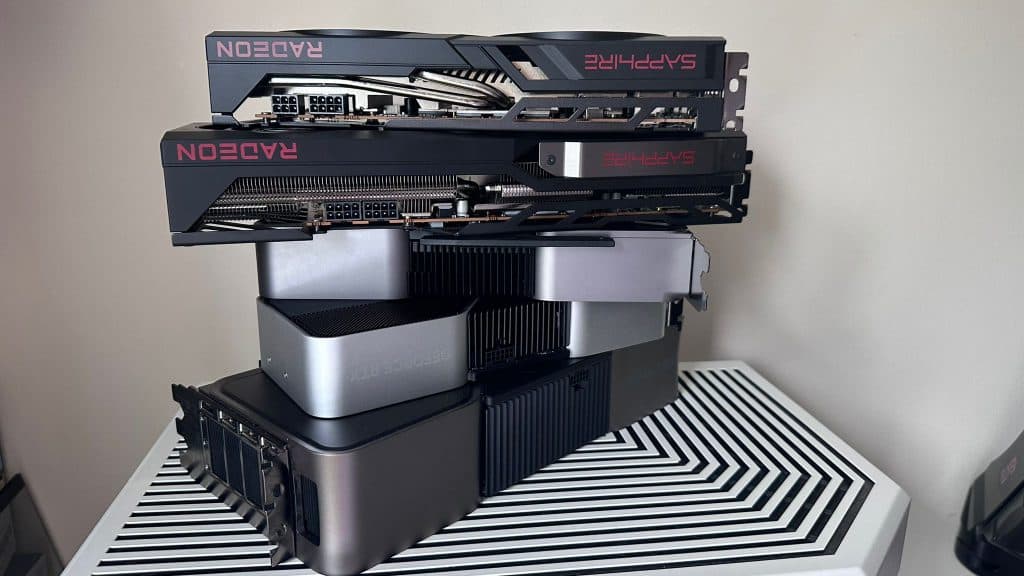 Dexerto
Dexerto | Game | RTX 4060 Ti 8GB Founders Edition | Sapphire Pulse RX 6700 XT | Sapphire Pulse RX 6800 | RTX 4070 Founders Edition |
| Forza Horizon 5 (Ultra, RT & DLSS off) | 129 FPS | 103 FPS | 142 FPS | 151 FPS |
| Cyberpunk 2077 (Ultra, RT Ultra, DLSS 3 Performance, Frame Generation / FSR) | 110 FPS | 38 FPS | 55 FPS | 149 FPS |
| Cyberpunk 2077 (Ultra, RT Ultra, DLSS off) | 41 FPS | 25 FPS | 40 FPS | 60 FPS |
| CS:GO (High, Dust 2) | 583 FPS | 532 FPS | 597 FPS | 647 FPS |
| Overwatch 2 (Ultra) | 372 FPS | 284 FPS | 418 FPS | 422 FPS |
At 1080p, the RTX 4060 Ti attains impressive results across the range of games that we tested. While it’s still slower than the $200 more expensive RTX 4070, it is only slower by a factor of 14%. Considering the performance on offer here, you should expect framerates well above 60FPS for almost any title you throw at it. When dealing with the heaviest gaming load possible, Cyberpunk 2077, the humble GPU still manages to push out a respectable 41 FPS of native rasterization performance.
Of course, AMD graphics cards are also a consideration here, so we’ve benchmarked the 6700 XT and 6800 next to the 4060 Ti. The 6800 outclasses it at 1080p pretty handily, but it’s clear that Nvidia still has the advantage when it comes to things like ray tracing and supersampling compared to Team Red.
You should expect most titles without ray tracing to push at triple-digit numbers in your favorite titles, and for most people, that’s more than enough performance at this resolution.
RTX 4060 Ti 8GB 1440p performance
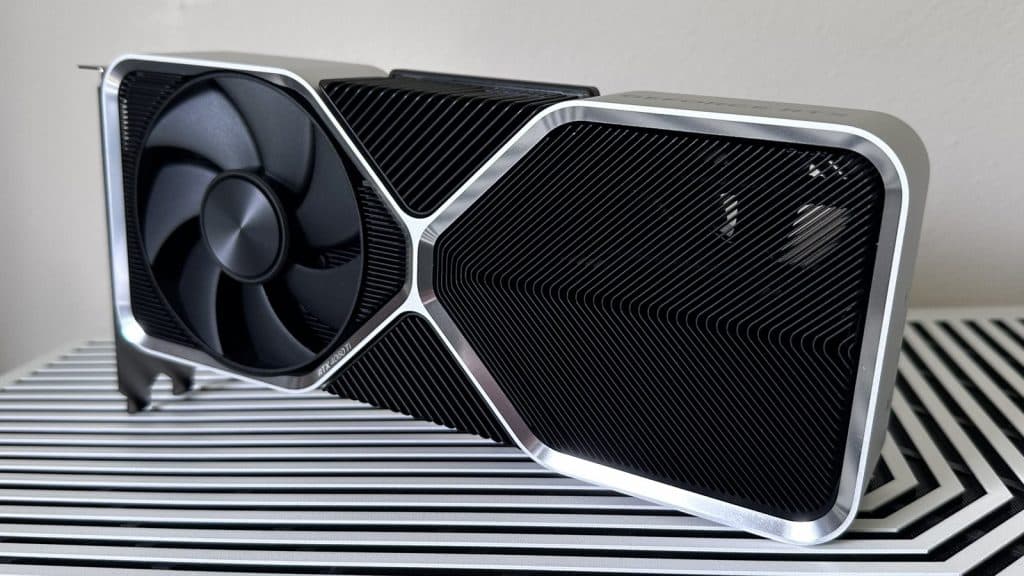 Dexerto
Dexerto | Game | RTX 4060 Ti 8GB Founders Edition | Sapphire Pulse RX 6700 XT | Sapphire Pulse RX 6800 | RTX 4070 Founders Edition |
| Forza Horizon 5 (Ultra, RT & DLSS off) | 108 FPS | 83 FPS | 129 FPS | 132 FPS |
| Cyberpunk 2077 (Ultra, RT Ultra, DLSS 3 Performance, Frame Generation / FSR) | 67 FPS | 28 FPS | 44 FPS | 126 FPS |
| Cyberpunk 2077 (Ultra, RT Ultra, DLSS off) | 32 FPS | 15 FPS | 20 FPS | 39 FPS |
| CS:GO (High, Dust 2) | 384 FPS | 419 FPS | 519 FPS | 607 FPS |
| Overwatch 2 (Ultra) | 234 FPS | 199 FPS | 293 FPS | 356 FPS |
At 1440p, we see a similar tale to the 1080p performance. While you will not be getting the fastest framerates, you will still manage to attain 60 FPS in mainstream titles without DLSS. Flip it on under ray-traced workloads, and the real advantage comes to light. DLSS 3 is one of the best technologies out there, and considering the price of the GPU, attaining 60FPS in Cyberpunk 2077 with all of its bells and whistles turned on is no small feat.
Here, the RTX 4060 Ti is slower than the RTX 4070 by around 40% in the titles that we tested. This just highlights how this GPU begins to fall behind, due to its AD106 chipset housed within. This jump leaves us feeling a bit uneasy – 1440p is one of the most popular resolutions outside of 1080p, but performance might still be out of reach for this humble GPU. We’re expecting that performance will be slightly better with the 16GB variant of the GPU landing in July.
AMD’s RX 6800 still manages to maintain a lead when it comes to pure rasterization performance, but with over 300 games now using DLSS 3 in some way, it becomes hard to ignore, especially for budget-oriented gamers.
RTX 4060 Ti 8GB 4K performance
| Game | RTX 4060 Ti 8GB Founders Edition | RTX 4070 Founders Edition | RTX 3080 Founders Edition | RTX 4070 Ti GIGABYTE Gaming OC | RTX 4080 Founders Edition | AMD Radeon RX 7900 XT |
| Forza Horizon 5 (Ultra, RT & DLSS off) | 77 FPS | 89 FPS | 92 FPS | 123 FPS | 137 FPS | 107 FPS |
| Cyberpunk 2077 (Ultra, RT Ultra, DLSS 3 Performance, Frame Generation) | 35 FPS | 72 FPS | 49 FPS | 86 FPS | 108 FPS | 44 FPS |
| Cyberpunk 2077 (Ultra, RT Ultra, DLSS off) | 1 FPS | 17 FPS | 13 FPS | 22 FPS | 29 FPS | 16 FPS |
| CS:GO (High, Dust 2) | 186 FPS | 204 FPS | 201 FPS | 252 FPS | 399 FPS | 340 FPS |
| Overwatch 2 (Ultra) | 126 FPS | 157 FPS | 148 FPS | 257 FPS | 446 FPS | 308 FPS |
So, the RTX 4060 Ti 8GB is not a card built for 4K gaming, at this resolution, some games might perform well with some settings turned down. However, looking at the benchmark for Cyberpunk 2077’s pure rasterization performance tells you everything you need to know.
Despite the expanded bus width, our memory usage almost immediately hit 100% with all those difficult-to-run ray tracing effects enabled. This is a pure capacity problem, as evidenced by the performance of the RTX 4070. It’s possible that once again, the upcoming 16GB model will help to massage this result somewhat.
We ran this benchmark multiple times in order to ensure there was no erroneous result, but the fact is, this is not a card built for 4K. However, you do get a playable 35 FPS with DLSS 3, the GPU’s magic bullet for performance in titles that support it.
Synthetic benchmarks
| Benchmark | RTX 4060 Ti 8GB Founders Edition | Sapphire Pulse RX 6700 XT | RTX 3070 Founders Edition | Sapphire Pulse RX 6800 | RTX 4070 Founders Edition | RTX 4070 Ti GIGABYTE Gaming OC | RTX 4080 Founders Editon | RTX 4090 Founders Edition | AMD Radeon RX 7900 XT |
| Speed Way | 3112 | 2268 | – | 3038 | 4520 | 5471 | 7179 | 10310 | 4697 |
| Port Royal | 7777 | 6326 | 8027 | 7648 | 11293 | 14230 | 17829 | 22598 | 13074 |
| Time Spy Extreme (Graphics score) | 6231 | 6051 | 6849 | 7705 | 8608 | 11015 | 14028 | 18578 | 12979 |
The RTX 4060 TI is a budget card, and for $399 you attain good results in 3DMark’s synthetic benches. Though the GPU begins to lose against the RX 6800, the 4060 Ti 8GB is faster than the 6700 XT in almost every game and benchmark that we threw at it.
Luckily, we previously benchmarked an RTX 3070 in this exact same software after its launch several years ago and can pull in data from Nvidia’s previous-generation efforts.
It’s also important to note that in synthetic benchmarks, the RTX 3070 is just plain faster than the 4060 Ti in many aspects. Results were higher by several hundred points on average. The same can be replicated in Port Royal. Since Speed Way was a recent release, we were unable to get 3070 data on hand for that particular benchmark.
However, from these results, we can also infer that there is a very small gen-on-gen performance uplift when comparing the 4060 Ti 8GB to the RTX 3070. It almost reminds us of the 20-series launch several years ago. Higher prices for new tech come alongside slightly more disappointing pure rasterization performance.
Thermals and noise
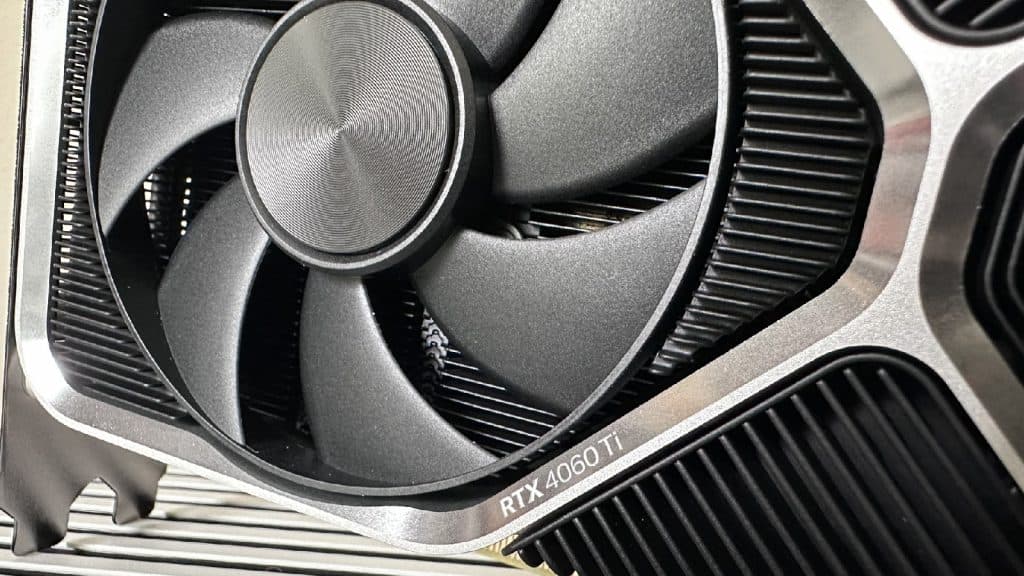 Dexerto
Dexerto The RTX 4060 Ti 8GB’s heat-spreader manages to cool the GPU effectively, and on this particular GPU, we did not hear even a single whisper of coil whine. When looking at maximum temperatures while gaming, we saw the graphics card reach a comfortable 76 degrees when playing Cyberpunk 2077 at 1440p on Ultra with DLSS and Frame Generation enabled. The GPU still manages to maintain a speedy clock, though it did decrease slightly as we approached those higher temperatures.
The flow-through cooler also works excellently, with minimal fan noise inside our Hyte Y60 case.
Power efficiency
This GPU continues the incredibly impressive trend of Nvidia graphics cards this generation being incredibly power efficient. Though the GPU is rated to use power up to 160W, our average gaming workload topped out at just 140W. This is incredibly impressive. Considering the low thermal density of this GPU, it could be a strong contender for those looking to make ITX-based esports systems in the future.
Should you buy it?
At $399, it’s really difficult to fault the RTX 4060 Ti 8GB. However, it’s important to note that this recommendation comes with several caveats. This GPU excels at 1080p, attaining triple-digit performance. But, the RTX 4060 Ti 8GB lags behind at higher resolutions. You’re also going to get a lower generational uplift in performance. With that said, you also get access to groundbreaking new tech like DLSS 3, which feels genuinely magical while in use.
It really depends on who you are, and what you’re using. For those stuck on a lower-end 10 or 20-series graphics card, the RTX 4060 Ti 8GB is an impressive GPU if you’ve got no aspirations beyond 1080p. We were just expecting a little bit more than that. We might feel more comfortable with the 16GB variant, but the current benchmarks of the GPU supplied by Nvidia do not indicate a huge jump in performance, either.
The Verdict: 3/5
The RTX 4060 Ti 8Gb is a GPU built on compromise. It does offer good performance in many titles, and can even perform at 1440p. For $399, your money extends further thanks to the DLSS 3 technology and other goodies like AV1 encoding. However, you have to know exactly what kind of resolution you are targeting ahead of time. Things like the smaller bus width, 8GB of VRAM, and small generational uplift are disappointing. DLSS 3 does go some way to smooth those issues over, but it’s not the be-all-end-all for graphics cards.
If you click on a product link on this page we may earn a small affiliate commission.